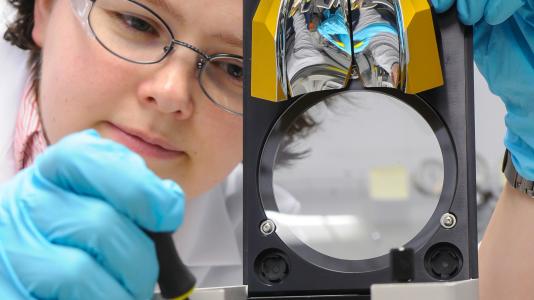
Argonne ranked 11th in the survey, honored by the magazine for its effort to help postdocs navigate their careers.
The laboratory also received high marks for its open door communications policy, specifically for encouraging postdocs to reach out to the highest offices within the laboratory to further their work.
Harold Myron, director of the Division of Educational Programs (DEP) at Argonne, said he is thrilled about the honor.
He said the laboratory’s 240 postdocs play a vital role in furthering Argonne’s mission and that it is good to know they believe they are valued and well cared for.
“It’s wonderful to see that they feel we’re doing a good job protecting their interests,” he said. “We strive to put our postdocs in contact with lab management and help them with their next job, whether it’s here at Argonne or not. We’re glad they believe we are providing them with solid training, quality facilities and a nurturing atmosphere.”
Tom Peterka, a Chicago native, joined Argonne as a postdoc more than two years ago.
He works in Argonne’s Mathematics and Computer Science division and said he would like to stay at the laboratory until he retires.
Asked what he loves most about his experience, his answer is simple: Everything.
“I am extremely happy here,” Peterka said. “The people I work with are experts in the field. Not only do I have a chance to collaborate with researchers here at the lab, but with top-notch scientists from around the globe. I also have access to some of the highest-quality computing facilities in the world. These are things I would not have anywhere else.”
Argonne has taken an innovative approach to bringing postdocs together and encouraging their professional growth. The laboratory’s Speed Collaborating program allows postdocs to spend three to five minutes talking about their work with potential collaborators before switching seats and moving onto the next colleague. Modeled after speed dating, it has proven extremely popular.
Argonne is also working on a mentorship program that would pair postdocs with those who might help them along. Until then, they have a key resource in Giselle Sandi, Postdoctoral Program Coordinator.
Sandi has a special connection with the postdocs she assists, most of whom are from other countries, including India, China, Pakistan, Mexico and Argentina. Sandi is originally from Costa Rica and knows well the struggles of people coming to the U.S. for the first time. She’s also a scientist—she was a researcher at Argonne for 12 years before moving to her current position.
“Postdocs come to me for two reasons,” she said. “They know I understand what it is to be a postdoc, that I empathize with their struggle to get good data and write quality papers. They also know I have a family—a husband and children—and that I value creating a balanced life.”
The reassurance Sandi offers is valuable, especially for postdocs who wonder about their next move. Should they start teaching as she does? Should they mention a new idea to a supervisor? Should they ask to be a lead writer on an important paper? No matter what the question, her door is always open.
Of course, Sandi is not the lab’s only resource. Argonne’s Newcomers Assistance Office provides all employees—including postdocs—with information about housing and child care, among many other topics.
The laboratory’s extensive DEP website includes information on everything from how to obtain a driver’s license to where to buy Chicago Cubs tickets. It even includes a few pointers about American cultural norms, including how much to tip at a restaurant.
The lab also boasts a Postdoctoral Society—all postdocs are automatic members—which works closely with the DEP to make sure the postdoc’s needs are met.
Argonne officials say it is this network—the sense of community they work to foster—that has earned them praise.
As for the survey, The Scientist said on its website that it collected its data through an on-line questionnaire aimed at non-tenured scientists working in academia or other non-commercial research organizations.
More than 3,100 people responded, assessing their working conditions by indicating their level of agreement with 43 criteria.
The 20-year-old magazine—which is based in Philadelphia--ranked 75 U.S. institutions and several non-U.S. sites.
Argonne ranked 13th in the same survey last year.